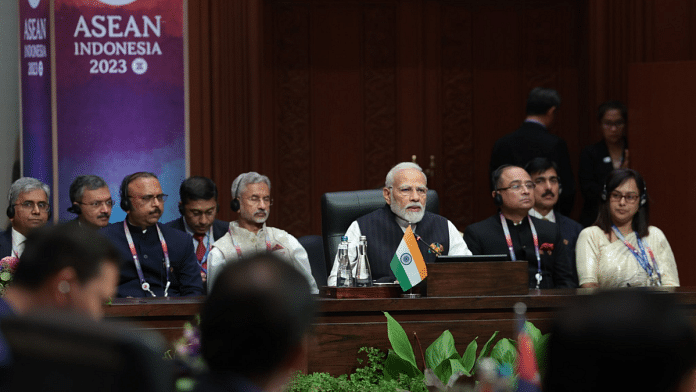New Delhi: India is one of the three least strategically relevant countries to the Association of Southeast Asian Nations (ASEAN) while China maintains its position as the most influential economic and political-strategic power in the region, according to a study published Tuesday.
Specifically, India ranks ninth out eleven countries among major powers’ regional influence and leadership in the region.
The report, ‘The State of Southeast Asia 2024’, published by the ISEAS – Yusof Ishak Institute, an autonomous research organisation set up by the Singaporean parliament in 1968, surveyed 1,994 respondents from the 10 ASEAN countries — Brunei Darussalam, Cambodia, Indonesia, Laos, Malaysia, Myanmar, the Philippines, Singapore, Thailand, and Vietnam.
It offers a snapshot of the prevailing attitudes among the populations within these countries. Of the respondents surveyed, 43.9 percent believed that China has the most political and strategic relevance to the ASEAN member-states, while 25.8 percent believed the same about the US.
Only 0.4 percent of respondents said the same of India. As a mean score out of 11, Southeast Asians chose China as the most strategically relevant partner with a score of 8.98. India, which ranks ninth out of the 11 major power countries, had a mean score of 5.04.
The other major power countries surveyed are the US, Japan, South Korea, the European Union (EU), the United Kingdom, Australia, Russia, Canada and New Zealand.
After China, the US was found to be the second most strategically relevant partner for Southeast Asians with a mean score of 8.79, while Japan with a score of 7.48 finished the top three. India (5.04), Canada (3.81) and New Zealand (3.70) were the three least relevant countries.
The Indian government has been attempting to gain influence within Southeast Asia, with External Affairs Minister S. Jaishankar’s most recent foreign visits were to Singapore, the Philippines and Malaysia between 23 and 27 March.
Underscoring New Delhi’s ‘Act East’ push, Prime Minister Narendra Modi participated in the 20th India-ASEAN Summit and 18th East Asia Summit in Jakarta, Indonesia, days before hosting the G20 summit at New Delhi in September 2023.
Also Read: Whisky, spices, masala peanuts — Indian diplomacy afoot in China
Perceptions of India in Southeast Asia
Of the 10 ASEAN countries, respondents from Myanmar and Singapore ranked India as fifth and sixth respectively in terms of strategic relevance — highlighting the favourable perceptions held by its neighbour and the historical-cultural relationship between the countries, according to the survey.
In comparison, respondents from Cambodia, Laos, the Philippines and Vietnam, ranked India ninth in terms of strategic relevance – reflecting the “influence of geopolitical alignments and regional dynamics on perceptions of India’s importance,” noted the survey.
As for championing global free trade — a cause promoted by ASEAN, India ranks last of the eleven countries surveyed. Only 1.1 per cent of Southeast Asians are confident that India is a champion of global free trade. Southeast Asians believe that ASEAN (29.7 percent of respondents) and the US (22.1 percent) are the region’s “foremost advocates” in championing free trade.
Southeast Asians also show little confidence in India providing leadership to maintain the rules-based order and uphold international law. Only 0.6 percent of respondents have confidence in India’s role in providing leadership to maintain the rules-based order. In comparison, 27.9 percent believe the US is the foremost champion of the rules-based order.
However, 40.9 percent of the respondents believe that the Quadrilateral Security Dialogue (also known as Quad) comprising India, the US, Japan and Australia will be beneficial to the region. This is an increase from 31 percent in 2023.
However, those who believe that Quad will be complementary to ASEAN’s efforts in the region declined from 37.8 percent in 2023 to 32.2 percent in 2024.
It should be noted that the survey found more respondents preferring to align with China over the US in the region. In 2024, 50.5 percent of respondents choose to align with China if forced to choose between the two geo-political powers, a sharp increase from 38.9 percent in 2023.
Those who believe in aligning with the US dropped from 61.1 percent in 2023 to 49.5 percent — highlighting the surge in support for China across the region. Respondents from Malaysia (75.1 percent), Indonesia (73.2 percent) and Laos (70.6 percent) show strong support for China.
The report finds strong support among Southeast Asians to look at the European Union and Japan as the primary countries to broaden ASEAN’s strategic options. India is third among the choices of Southeast Asians with 10.5 percent of the respondents believing New Delhi as a viable partner in broadening ASEAN’s strategic options.
(Edited by Tony Rai)
Also Read: Jaishankar says India supports Philippines’ sovereignty amid tensions in South China Sea



